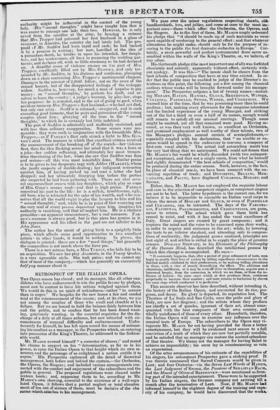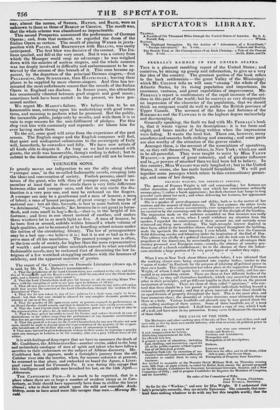RETROSPECT OF THE ITALIAN OPERA.
'THE Opera season has closed; and its manager, like all other can- didates who have endeavoured to win the public favour by pledges, must now be content to have his actions weighed against them. We would do this in no spirit of unkindness—rather "in sorroiw than in anger." We bespoke for the new lessee a fair and candrd trial at the commencement of the season; and, at its close, we aie not among the number of those who exult and chuckle at h s failure. But we are bound to hold the balance fairly between him and the public, and to confess that he has been found want- ing, grievously wanting, in the essential requisites for the dis- charge of a duty at all times arduous, but now attended with cir- cumstances of unusual difficulty and embarrassment. Unfor- tunately for himself, he has left upon record the means of estimat- ing his.concluct as a manager, in the Prospectus which, on entering into possession of the King's Theatre, he addressed to the fashion- able world.
Mr. MASON avowed himself" a corrector of abuses '-" and rested his .claims to support on his "determination, as far as in his power, to raise the Italian Opera to that height which its own re- sources.and the patronage of so enlightened a nation entitle it to aspire." his Prospectus embraced all the detail of theatrical management, both before and behind the curtain,—the Orchestra, the Operas, the Singers; and included various arrangements con- nected with the comfort and enjoyment of the subscribers and the public in general. The proposed regulations were classed under sixteen heads; and, supposing them to: be, according to Mr. Meson's own:showing, essential to the existence of a well-regu lated Opera, it follows that a partial .neglect or total abandon merit of ten out of sixteen of them, must be decisive of the cha raeter,whichattwhes to his management, We pass over the minor regulations respecting shawls, silk. handkerchiefs, ices, and jellies, and come at once to the most im- portant ones—those which affect the Orchestra, the Operas, and the Singers. As to the first of these, Mn MASON amply redeemed his pledge that " it should be made up of such materials as were, most capable of conducing to the general effect ; and that whatever alterations he might make, should only be for the purpose of in- suring to the public the first dramatic orchestra in Europe.' Cer- tainly, a more powerful and perfeet instrumental force never as- sembled within the walls of the King's Theatre, or, we believe, of any other.
His thirteenth pledge (the most important one of all) was forfeited absolutely and entirely, apparently without effort, certainly with- out apology. It was this—" The music shall be chosen from the best schools of composition that have at any time existed. In or- der that the public may be enabled to judge of the Director's in- tentions on this point, the following are a few among the classical. authors whose works will be brought forward under his manage- ment." The Prospectus subjoins a list of twenty names—includ- ing MOZART, HAYDN, HANDEL, GLUCK, BEETHOVEN, WINTER, CIMAROSA, PAESIELLO, SPORE, WEBER, and CHERUBIM. We: warned him at the time, that he was promising more than he tumid perform ; but, making every allowance for the sanguine intentionsr and the limited experience of the young Manager, and striking. out of the list a third or even a half of its names, enough would.- still remain to satisfy all our musical cravings. Though some might be omitted, yet all that remained were good. Having se- cured, as was then very well known, so excellent an Orchestra, and promised employment so well worthy of their talents, two of the Manager's pledges seemed certain of accomplishment,— • especially coupled with his declaration, that "no trouble or ex- pense would be spared in the endeavour to convene a company of first-rate vocal ability." The actual End astounding result was • the very last thine that we anticipated. We could not dream that Mr. MASON'S list would be wholly discarded (with two unimport- ant exceptions), and that not a single opera, from what he himself had rightly denominated "the best schools Of composition," would be produced during the entire season. Such, however, is the fact. In place of classical music, we have been annoyed with the un- • varying repetition of trash; and DONIZETTI, BELLINI, MER- CADANTE, and PACINI, have displaced CIM-4ROSA, MOZART, and SPOHR.
Either, then, Mr. MASON has not employed the requisite labour and care in the selection of competent singers, or competent singers - are not to be had. The latter hypothesis is the correct one, for we believe it to be impossible to assemble an Italian vocal corps to whom the music of MOZART and GLuex, or even of PAESIELLIT and CIMAROSA, can be intrusted. The days of the FARINEL- LIS, FAUSTINAS, PA.CCHIEROTTIS, and CRESCENTINIS, ate gone, never to return. The school which gave them birth has ceased to exist, and with it has ended the vocal excellence of Italy., Great e are created by great composers; and it requires the mind and the voice to be exercised upon their works, in order to acquire real eminence in the art; while, by lowering the taste to an inferior standard, and attending only to composi- tions of mediocrity, the judgment grows confused, principles are lost sight of, and artifice is called in to supply the place of genuine science. DUGALD STEWART, in his Elements of the Philosophy of' the Human Mind, has described the intellectual process by- which this change is accomplished. He says- " It commonly happens, that, after a period of great refinement of taste, men begin to gratify thew love of variety by adding superfluous circumstances to the finished models exhibited by their predecessors, or by making trifling alterations in them, with a view of merely diversifying the effect. The additions and. alterations indifferent, or it may be even offmsive in themselves, acquire soon a borrowed beauty, from the connexion in which we see them, or from the in- fluence of fashion : the same cause which at first produces them, continues perpetually to increase their number ; and taste returns to barbarism by almost the same steps which conducted it to pedection."
This accurate observer has here described, without intending it, the history of the Italian Opera, and accounted for its rise, pro- gress, and decay. Its glory is departed, its reputation lost. The Theatres of La Scala and San Carlo, once the pride and glory of Italy, are now her disgrace ; and the artists whom they produce axe chiefly a set of quacks, ignorant of their art, almost unac- quainted with the best composers of their own country, and ' wholly uninformed of those of every other. Henceforth, therefore, the Italian Opera will cease to exercise any influence over the musical taste of Europe. The subscribers to the Opera may vi- tuperate Mr. MASON for not having provided for them a better. entertainment, but they will be awakened next season to a full conviction of a truth of which they are now but partially sensible, , and be satisfied that no manager can restore the ancient splendour of that theatre. We blame not the manager for having failed to achieve an impossibility; his error lay in countenancing so yarn- an expectation. Of the utter erroneousness of his estimate of the capabilities of his singers, his subsequent Prospectus gave a striking proof. It was therein announced that Sacred Concerts would be given in Lent; and four Oratorios—viz. the Seven Last Words of HAYDN, the Last Judgment of SPOHR, the Passione of SEBASTIAN BACH, and the Mount of Olives of BEETHOVEN—were mentioned as form- ing part of the intended entertainment. These were to be supported.. by his Italian singers, the German company not arriving till a month after the termination of Lent. Now, if Mr. MABON had. informed himself in the slightest degree of the training and cam!. city of his company, he would have discovered that the works, nay; almost the names; of SPOHR, • HAYDN, and BActi, were as unknown to them as those of %SHOP or CROTCH. The result was, that the whole scheme was abandoned as impracticable.
This second Prospectus announced the performance of German Operas ; and, from that moment, we regarded the doom of the Italian Opera as certain. The result of placing WEBER in juxta- position with PACINI, and BEETHOVEN with BELLINI, was easily anticipated. The first blow was decisive of the contest. The Ita- lians quailed, and fell at the very onset. But it was a victory from Which the Manager could reap no advantage : he was weighed ,down with the salaries of useless singers, and the whole concern was too deeply involved in difficulty and embarrassment to be re- -grieved by the success of this branch of it. This soon became ap- parent, by the departure of the principal German singers,—first PELLEGRINI, then SCHROEDER, then HAITZI NGER ; leaving their places to be supplied by mere chorus-singers. And thus has ter- minated the most unfortunate season that the records of the Italian Opera in England can disclose. In former years, the attraction has occasionally vibrated between good singers and good music; sometimes both have been united : in the present, we have pos- sessed neither.
We regret Mr. MASON'S failure. We believe him to be an honourable man, entering upon his undertaking with good inten- tions, and meaning to perform what he promised. But the public, the inexorable public, judge only by results, and with them it is in vain to urge reasons for the non-fulfilment of pledges. For this they visit him with contumely and reproach: we blame him for ever having made them.
• To the art, some good will arise from the experience of the past season. The English singer and the English composer will feel, that quiet and undisputed submission to the sovereignty of Italy *ill, henceforth, be cowardice and folly. We have now artists of all kinds able to dispute it. As long as we had to contend with giants, the strife was honourable, though ending in defeat; but to submit to the domination of pigmies, cannot and will not be borne.



























 Previous page
Previous page